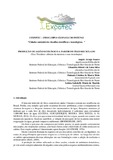Produção de sabão ecológico a partir de óleo reciclado

Visualizar/Abrir
Data
2017-03-08Autor
Silva, Ulisandra Ribeiro de Lima
Melo, Dainara Cristina de Moura
Macedo, Letícia Gabrielly Muniz de
Soares, Angelo Araujo
Metadado
Mostrar registro completoResumo
The undue disposal of edible oils is still quite common in Brazilian households. However, this simple action can cause several problems, such as sewage system clogging and premature water pipe wear. Previous research has already indicated that every liter of oil unduly discarded is enough to contaminate 1,000,000 liters of water (LUCENA; ALBUQUERQUE; MOURA, 2014; SOUZA, A. O; MORAIS, 2014). Oils due to lower density of water, when in contact with aquatic sources, remain on the surface, reducing the passage of light causes less oxygenation of the water, generating environmental impacts (BIODIESELBR, 2007).
Oils and fats are composed of fatty acids, which when properly mixed, in correct proportions, with strong bases such as sodium hydroxide produce the soaps. This chemical reaction is called saponification (ALLINGER, 1976).
Since the Roman empire there are records of the use of soaps for purposes of hygienic use. The ruins of ancient Pompeii have remnants of the manufacture of soaps. Over the centuries the soaps presented several changes in their formulation as the addition of essences and flavorings (REIS, 2009).
The production of soaps using waste oils from domestic environments has already been proven to be a safe and environmentally sound practice. For this action is obtained the reuse of a waste, the preservation of aquifers and the reduction of problems of clogging of sewage systems. These soaps are known as ecological soaps (AZEVEDO, 2009).
For the production of soaps that do not pose risks to human health some criteria must be met, one of them is the saponification index (MERCADANTE, 2009). The saponification or Kottstorfer index is the number of milligrams of potassium hydroxide (KOH) required to saponify 1 g of oil (DE PESQUISA AGROPECUÁRIA, 1994; LUZ, 2007).
In this way the research aims to promote the project called production of ecological soaps from recycled oils. The main actions of this research are: training of the students participating in the project, tests to determine the saponification index of the recycled oils, promotion of workshops with the student body of the IFRN Campus of São Paulo do Potengi, as well as with the community in general and training the public to produce ecological soaps.



